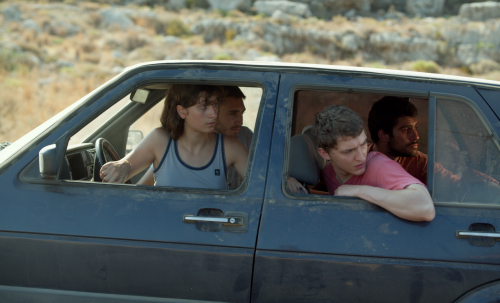
Faktura Film/Shellac
MOVIE REVIEW
Music (2023)
This is a puzzling and frustrating film about – well. It's told in fragments, with only the bare minimum of dialogue, with songs (primarily opera) serving as verbal cues for what is doing on. This kind of minimalism – over four decades pass; and the action slowly morphs from Greece to Germany without anything directly being said about it – is so minimalist it's tricky to know what writer-director Angela Schanelec was going for, though she won the award for Best Screenplay at this year’s Berlinale for it. “Music” is one of those emotional experiences it might take another couple decades for me to process. Does this make it good? I don't know.
A plot barely exists, but such as it is: There's an accident on a hillside which leads to a paramedic finding an infant in a mountainside goat shed. The infant grows up to commit murder on another hillside. Jon (Aliocha Schneider) goes to prison – in Greece the prison shower shoes are raised clogs – and whilst there one of the guards, Iro (Agathe Bonitzer), falls in love with him. Jon has a gorgeous singing voice; and they communicate through their favorite arias. After his release they have a daughter and move to the countryside, where eventually Iro has a horrifying epiphany. And then other things happen.
All this unfolds in a slow, guarded style where each separate shot gives you plenty of time to consider whatever is happening onscreen. The opening shot is of a mountainside slowly covered by cloud, which takes a couple minutes; and the pace is rarely anything less than leisurely. Iro buying foot cream in a city pharmacy is so action-paced compared to everything else it’s basically the car chase in “Bullitt.” Everyone in the prison, prisoners and guards alike, clearly work as professional models on the side. There are virtually no clues to the passing of time – not in the cars, clothes or hairstyles; and all visible tech is deliberately retro – meaning that the continuing connections are for us to ponder as a car loses one of its tires, or a lizard crawls onto a woman's bare ankle, or a man stands in an empty room and sings the most beautiful song you've ever heard.
Festivals such as the Berlinale are the true home for films such as this, not least because a committed international film-buff audience might be the only ones who will pay “Music” the attention it deserves. The peculiar attitude to dialogue – in that there's one single scene which relies on words to forward the action – is not what audiences are used to. But this is not a silent-style film, far from it. It's about sensation, and how music is the best tool for expressing overwhelming sensations. It goes the long way around the barn to get there, but ask me in 2043 if I am still thinking about “Music,” and I suspect the answer will be yes.
Comments